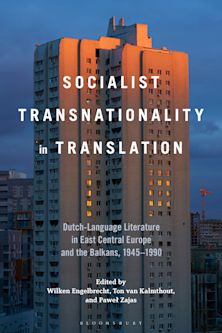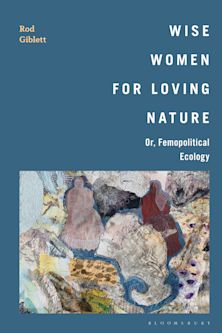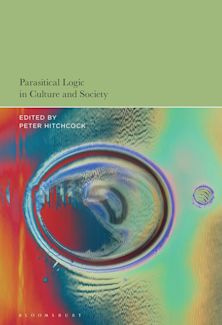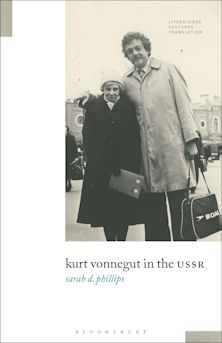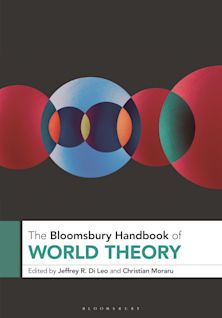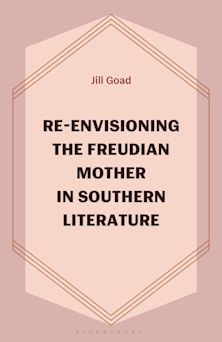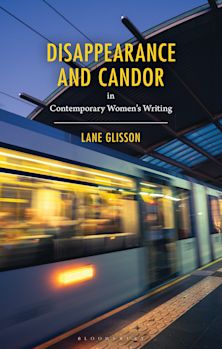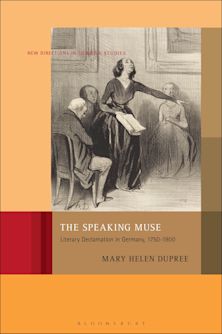The Geschlecht Complex
Addressing Untranslatable Aspects of Gender, Genre, and Ontology
The Geschlecht Complex
Addressing Untranslatable Aspects of Gender, Genre, and Ontology
Description
The polysemous German word Geschlecht -- denoting gender, genre, kind, kinship, species, race, and somehow also more -- exemplifies the most pertinent questions of the translational, transdisciplinary, transhistorical, and transnational structures of the contemporary humanities: What happens when texts, objects, practices, and concepts are transferred or displaced from one language, tradition, temporality, or form to another? What is readily transposed, what resists relocation, and what precipitate emerges as distorted or new?
Drawing on Barbara Cassin's transformative remarks on untranslatability, and the activity of “philosophizing in languages,” scholars contributing to The Geschlecht Complex examine these and other durable queries concerning the ontological powers of naming, and do so in the light of recent artistic practices, theoretical innovations, and philosophical incitements. Combining detailed case studies of concrete “category problems” in literature, philosophy, media, cinema, politics, painting, theatre, and the performing arts with a range of indispensable excerpts from canonical texts -- by notable, field-defining thinkers such as Apter, Cassin, Cavell, Derrida, Irigaray, Malabou, and Nancy, among others -- the volume presents “the Geschlecht complex” as a condition to become aware of, and in turn, to companionably underwrite any interpretive endeavor.
Historically grounded, yet attuned to the particularities of the present, the Geschlecht complex becomes an invaluable mode for thinking and theorizing while ensconced in the urgent immediacy of pressing concerns, and poised for the inevitable complexities of categorial naming and genre discernment that await in the so often inscrutable, translation-resistant twenty-first century.
Table of Contents
Appendix I: Unfinished Definitions (Jansson/LaRocca)
Apter | Cassin | Cavell | Crépon
2. Antitheatricality as Critical Idiom (Caro Pirri, University of Pittsburgh, USA)
3. The Cruel Beast: Settler Sovereignty and the Crisis of American Zoopolitics (Brian W. Nail, Florida State College at Jacksonville, USA)
4. Between the Body and Language: Narratives of the Moving Subject in Okwui Okpokwasili's Bronx Gothic (Lauren DiGiulio, University of North Carolina at Chapel Hill, USA)
Appendix II: Indefiniteness, Geschlechtlosigkeit, Undoing (Jansson/LaRocca)
Butler | Cassin | Crépon | David-Ménard | Derrida |
Deutscher | Heller-Roazen | Irigaray | Malabou | Nancy |
Preciado | Sandford | Spillers | Weheliye
5. Collapsing the Gender/Genre Distinction: On Transgressions of Category in Woolf's Orlando (Oscar Jansson, Lund University, Sweden)
6. Gazing at the Untranslatable Subject: From Velázquez's Las Meninas to Ellison's Invisible Man (Richard Hajarizadeh, SUNY Binghamton, USA)
7. From Lectiocentrism to Gramophonology: Listening to Cinema and Writing Sound Criticism (David LaRocca, Cornell University, USA)
Appendix III: Genre Unlimited/Genre Ungenred (Jansson/LaRocca)
Apter | Barthes | Cavell | Chartier | Crimmins |
Croce | Derrida | Jauss | Wells
Afterword: Trans-Ontology and the Geschlecht Complex (Emily Apter, New York University, USA)
Bibliography
Acknowledgments
Contributors
Index
Product details

| Published | 13 Jan 2022 |
|---|---|
| Format | Ebook (Epub & Mobi) |
| Edition | 1st |
| Extent | 368 |
| ISBN | 9781501381935 |
| Imprint | Bloomsbury Academic |
| Publisher | Bloomsbury Publishing |
Reviews

ONLINE RESOURCES
Bloomsbury Collections
This book is available on Bloomsbury Collections where your library has access.














